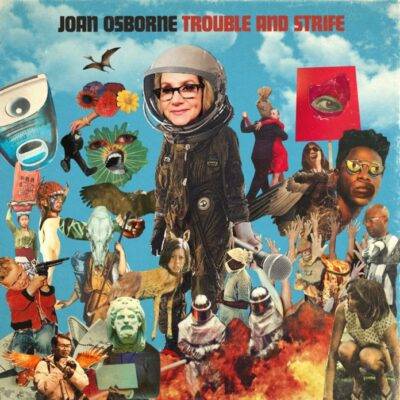Joan Osborne Trouble and Strife
Joan Osborne
Trouble and Strife
Womanly Hips Music
Trouble and Strife, self-produced on her own label, is her tenth solo studio album and the first album of Joan Osborne’s original material in six years, since 2014’s Love and Hate. It’s Osborne, one of the best and certainly most versatile singers of our time, responding to the crazy world we live in now, rife with political commentary, but designed mostly to uplift as music should do. Musically it’s a mix of retro and contemporary, touching on the many roots genres where Osborne has proved to be adept. She says, “For a lot of the record, we were going for a ‘70s AM radio vibe. As for the lyrics, the songs ‘are the most political I’ve ever written.”
Given Osborne’s status, she attracts gifted musicians, several of whom appeared on her most recent project, Songs of Bob Dylan. They are guitarists Jack Petruzzelli, Nels Cline, and Andrew Carillo, keyboardist Keith Cotton, bassist Richard Hammond and drummer Aaron Comess. And she does just as well in recruiting background vocalists Catherine Russell, Ada Dyer, Martha Redbone and Audrey Martellis, (no more than two singers on any track) many of whom she has also worked with previously. Osborne put plenty into this one – a wide span of genres, melodic hooks, gritty grooves, and fearless lyrics.
The album opens in buoyant fashion with “Take It Any Way I Can Get It,” signaling the message of re-invigoration with “I’m still survivin’/I got to be dancin’’ bolstered by the duo of background vocalists. The second track goes in a completely different direction but ultimately points to uplift. It begins with the voice of Texan Ana Maria Rea, whose family emigrated to the U.S. when she was a child. “What’s That You Sau” tell the story of family coming from Mexico City, where her father had been kidnapped, to the U.S. and how difficult that was. Osborne says, “Her message is ‘I’m not afraid’ and her mission is to help other people who are in the same position she was in.” Moving into an angrier mode, we get the bluesy, excoriating “Hands Off,” aimed at exploiters of people and the planet; and later “That’s Was a Lie,’ which could be directed to politicians, corporate types, and/or the media – take your pick.
She co-wrote “Never Get Tired (of Loving You)” with Richard Hammond and her partner Keith Cotton, who mand the synthesizer for the tune written for her teenaged daughter, as if to day her love will remain constant despite the world’s surrounding chaos. Done in retro pop vein, she and the band take the serious subject into rather joyous and carefree musical territory. Similarly, even in the otherwise seemingly whimsical title track, she weaves in this verse, more than likely with Charlottesville on her mind – “Well the nice young men from the rodeo/Came down to Virginia just to say helot/They brought a lot of rifles/And they brought a lot of guns/Lord they were try na have some good clean fun/Next thing you know you’re runnin’ for your life/For ten long years of trouble and strife”
The tone changes dramatically with the sweeping ballad “Whole Wide World’ with Osborne’s immense vocal range on clear display over a Chi-Lites R&B vibe and an unequivocally hopeful message. Retro sounds color “Boy Doncha Know’ as Osborne sings about the obstacles those born female must overcome. Here is one of the most emphatic verses – “Just ask the ghost of Miss Monroe/Be the best in the world and have nothin’ to show/Be a meal for the wolves or a rich man’s prize/Look around at the world see the hunger in their eyes/Well it comes as no surprise.”
She didn’t leave her short-live tenure with Trigger Hippy completely behind either, In fact that band backs her on “Meat and Potatoes,” the title for which comes from how she describes them – a “meat and potatoes rock n’ roll band.” It was written with bassist Nick Govrik, extolling the virtues of Southern style down home cooking, and loving, yet another feel good song. Nor did she leave her three years of intensive Dylan listening and touring behind either, claiming it infuses the whole album with the weird characters than come in and out. We all know we have plenty of weird ones occupying our news cycles too and that plays in as well. Ostensibly the closer “Panama” may be a song of escape but it’s full of angry guitar lines, her expansive vocals, and caustic Dylanesque lines such as – “Some folks in this city/They’ve been livin’ way too large/The meek are in the jailhouse/The wicked are in charge/The truth is tarred and feathered now/They’ve run it out of town/But panama won’t let me/Let me down”.
This is Joan Osborne. She wants us to dance and sing along with her, whether the subjects are serious or lighthearted. She feels that the artist and music’s job is to lift us up and give us desperately needed energy. For that we should be thankful.
– Jim Hynes
Discover more from Making A Scene!
Subscribe to get the latest posts sent to your email.








